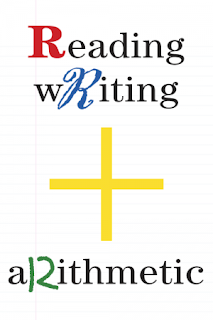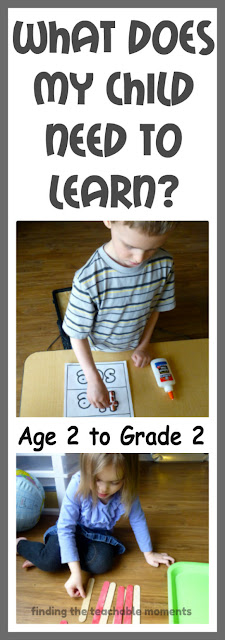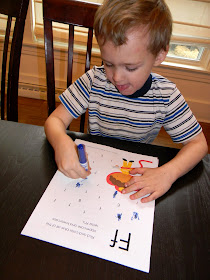What Does My Child Need to Learn? (Age 2- Grade 2 Learning Objectives)
What Does My Child Need to Learn? (Age 2- Grade 2 Learning Objectives)
This is the first post in my new series:
Click the image above to read the introduction and keep track of future posts in the series.
What does my child need to learn?
Before I could really go into the how; how to plan, prepare, and "do" school, I thought it would be beneficial to begin by filling you in on the what; what learning objectives and/or school subjects are age or grade appropriate (i.e. What in the heck should I teach?). I had a lot of questions about this when I first started, so I'm going to share with you my experiences and opinions. You may or may not agree. My goal here is not to claim expertise (because I don't have any), but rather to provide some inspiration and a little background info for future posts in the series.
Simple is best!
Seriously. Can't stress this enough. I'm better than anyone I know at
making things way harder than they need to be, so I am coming to you as a
woman who has lived and learned (the hard way).
Simplicity is important. So is your time. It is far quicker and easier for you to plan and prepare a few simple activities that only work on a few skills. More importantly, it is far easier for your child to focus on just a couple things at a time. So while I list several learning objectives for the younger ones, I don't think you need to include every one of them every day (or even every week). The more simple you make it, the happier everyone will be.
I know that makes sense so I won't go on any more and end up making it more complicated than it needs to be. 'Cause I tend to do that.
Simplicity is important. So is your time. It is far quicker and easier for you to plan and prepare a few simple activities that only work on a few skills. More importantly, it is far easier for your child to focus on just a couple things at a time. So while I list several learning objectives for the younger ones, I don't think you need to include every one of them every day (or even every week). The more simple you make it, the happier everyone will be.
I know that makes sense so I won't go on any more and end up making it more complicated than it needs to be. 'Cause I tend to do that.
Young Preschool (about age 2-3-ish)
I believe that all children learn best through play, but in this age range it is kind of a "must." The primary objective for this age group is try to instill a love of learning by making learning fun. Take the opportunity to expose little ones to various skills while playing!
Here are the concepts I aimed to familiarize my 2 year old with this year. We approached them through games, puzzles, learning toys, crafts and sensory play:
Fine motor. We all want our children to someday form letters properly and use scissors correctly. Fine motor "workouts" will give them a better ability to master these objectives later on. Play dough, beading, lacing, squeezing clothespins, etc. all get those small muscles ready for the "big kid" stuff of writing and cutting.
Pre-Math. Count out loud, work on number identification, practice 1:1 correspondence (one object represents the number 1, etc), learn basic shapes and colors, and sort objects by size, color or type.
Letters. Letter identification, the alphabet song, and teaching the sound that each letter makes.
Reading Comprehension. You've heard it said again and again, "if you want to raise a reader, read to your child daily." I would like to also add that getting your child to interact with books is an equally important goal. Ask questions, encourage them to point to pictures, ask what they think is going to happen on the next page, leave out familiar words and let them chime in, intentionally mispronounce a familiar name and let them correct you. Get them as involved as you can with the books you read to them so they develop reading comprehension skills naturally-- not to mention a love of books and reading!
While it's is not a typical week for us (we packed in a lot for this particular unit), the activities Corinne did for our Dr. Seuss week
is a good overview of many of the listed objectives in action. Since
the activities were related to Dr. Seuss books, they promote reading
comprehension while simultaneously working on other skills. I'm amazed
at how often we can find ways to multi-task learning objectives- love
that!
Preschool (approx. ages 3-4)
This is the age that various Pre-K packs really came in handy for me. I used them a lot with Max last year and this year (from age 3 to almost 5), and will be using them again with Corinne next year.
The packs include appropriate skills for the preschool level. Here's a list of what most of the packs include.... many also include activities that are more or less challenging than the following, but I've found most packs have these activities in common:
- Letter sound activities
- 1:1 correspondance (numbers 1-10)
- tracing/pre-writing practice
- cutting practice
- counting/ordering numbers 1-10
- upper/lowercase letter matching /identification
- sorting
- shadow matching
- beginning patterning
- size sequencing
- 3 part cards (activity that involves matching pictures and words... i.e. picture to picture, word to word)
We still include learning toys and puzzles, as well as crafts and
sensory play in addition to the printables for our preschool learning
time.
Our F is for Fire (Fire safety and Firefighter) week will give you a look at a fun hands-on preschool unit using pre-K packs along with crafts, sensory play, pretend play, etc.
Pre-K/K transition (approximately age 4.5-5.5)
Max was in this category this year. He had outgrown pre-K packs for the most part, and needed more of a challenge. Yet his fine motor skills still needed some work and he wasn't quite ready for Kindergarten. If you feel that your child is "somewhere in between," you be the judge of what skills he/she needs to focus on. They may or may not look like the ones listed below. Just go with what challenges (but doesn't frustrate) your little squirt. It may be a trial and error endeavor.
Transition skills for Max included:
- Rhyming words and word families (for example, the -at word family includes words such as cat, sat and bat)
- Beginning letter sounds
- Introduction to sounding out simple CVC words (CVC= Consonant Vowel Consonant)
- A few beginning sight words (a, the, and, see, I)
- Fine motor skills
- Simple math (recognizing teen numbers, simple addition with counters and patterning)
- Science and social studies concepts learned through books and sensory play
- Whatever he happened to "soak in" by sitting in on big brother's school time!
Many of the wonderful bloggers who create pre-K packs either offer a
separate download with more advanced activities, or include them within
the pack. (Likewise, many of them also offer lower-level "tot packs"
within the same theme. So if you have children close in age, it's fun
to learn together within a theme-- and explore science or social
studies concepts in the process).
Our Bean Unit highlights several objectives Max focused on this year.
Kindergarten (age 5-6)
If you homeschool, this may be the time you want to purchase more "formal" curriculum and begin taking school at home a bit more seriously. I personally don't think a formal curriculum is absolutely necessary for Kindergarten, but it is nice to have. Max will start Kindergarten next school year, and I do plan to use purchased curricula for him.
Kindergarten is typically the time that children begin reading (if they haven't already). For us, this will be the primary work of Kindergarten. Here's a look at what we will cover in the category of "reading":
- sight words
- learn to blend letter sounds to "sound out" words
- learn to distinguish between the beginning, middle and end sounds of basic CVC words
- learn some more word families
- practice reading aloud (beginning with BOB books and the printable easy readers that go along with our curriculum, and moving onto more difficult books from there)
- comprehension- answering questions such as, "Who are the main characters?" What happened in the beginning of the story?" "The middle?" "The end?" "What was your favorite part of the story?" I personally like to do crafts and activities that go along with books to aid in comprehension (and to help develop an overall love of reading).
**All of the above is totally doable for free with books from the
library and free printables. I choose to use some language arts
curricula that Max has responded well to as he sat in on Sam's lessons,
so I'm going with what seems to work!
Our whole Kindergarten syllabus will include:
- Reading with Ready2Read and All About Reading 1 (just the first half of the curriculum)
- Math
- Handwriting
- Science (no curriculum, just books and online resources
* Anything I link back to (curriculum-wise) are things we have already
tried, love, and are planning to use. Like All About Reading and Ready 2
Read. Just love them! :)
First and Second Grade:
Sam, my first (soon to be second) grader has ADHD and Sensory Processing Disorder. He is/was a struggling reader. He hates to write. I found that anything more than the "three R's" turned out to be just too much for him. He used up so much time and energy on just reading and math that anything beyond it was overwhelming to both of us. And after some struggling (for both of us), I learned my lesson on keeping it simple.
First and Second Grade:
Sam, my first (soon to be second) grader has ADHD and Sensory Processing Disorder. He is/was a struggling reader. He hates to write. I found that anything more than the "three R's" turned out to be just too much for him. He used up so much time and energy on just reading and math that anything beyond it was overwhelming to both of us. And after some struggling (for both of us), I learned my lesson on keeping it simple.
 |
| via |
I think a solid foundation in Reading is absolutely top priority. And that was what we focused the majority of our time learning this year. Other subjects will be much easier to incorporate once he's a fluent reader.
You can judge your child's ability and decide from there, but I'm gonna go ahead and still suggest that the three R's (and some fun science experiments and exploration) are enough for the Primary Grades... particularly if (s)he is not a fluent reader. That's just my opinion.
And honestly, if I would have read this advice this time last year.... I wouldn't have taken it. I was convinced that if I wanted to give my son the best possible education, I should include some sort of introduction to all possible school subjects (history, geography, foreign language, art, and music in addition to reading, writing and math). But it turned out that the best education for my son was to focus primarily on reading and math.
So next year (for second grade) here's what we're planning:
- Reading (fluency and sight words)
- Spelling
- Grammar (twice a week)
- Writing
- Handwriting
- Math
- Science (no curriculum, just exploration and what is able to be incorporated with reading and writing)
And that's my two cents on age appropriate learning objectives. If you
have any thoughts or questions, please share in the comments or send me
message. Hope you follow along with the rest of the series!




Comments
Post a Comment